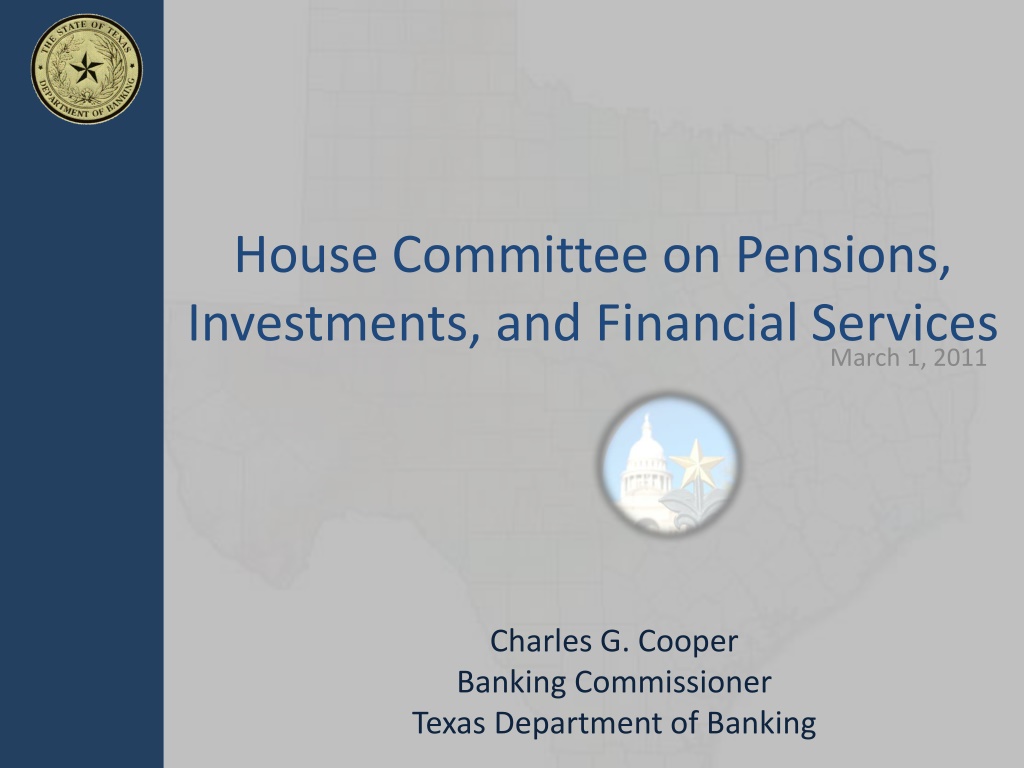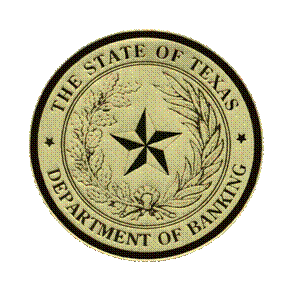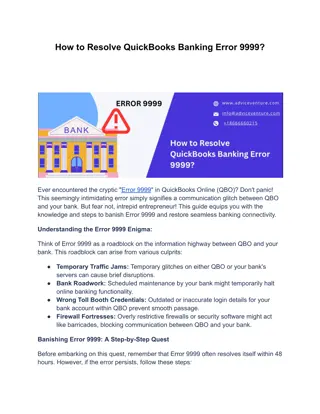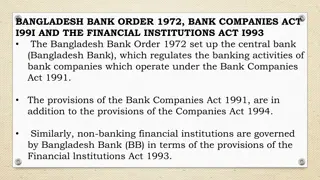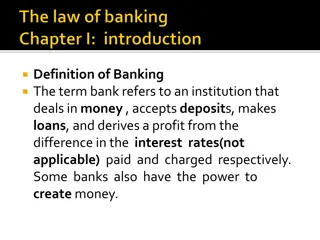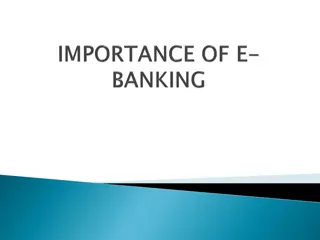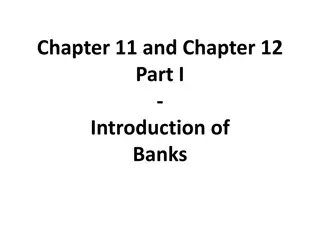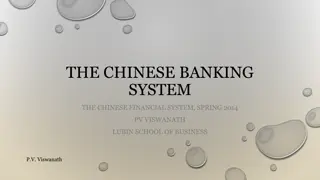Texas Department of Banking Overview
Established in 1905, the Texas Department of Banking ensures the safety, soundness, and competitiveness of the financial services system in Texas. With a focus on regulatory oversight, the department supervises a variety of entities including commercial banks, trust companies, foreign bank agencies, and more. Statutory mandates outline the requirements for examinations to safeguard the interests of depositors, shareholders, and clients. The department's motto is "Tough but Fair."
Download Presentation

Please find below an Image/Link to download the presentation.
The content on the website is provided AS IS for your information and personal use only. It may not be sold, licensed, or shared on other websites without obtaining consent from the author. Download presentation by click this link. If you encounter any issues during the download, it is possible that the publisher has removed the file from their server.
E N D
Presentation Transcript
House Committee on Pensions, Investments, and Financial Services March 1, 2011 Charles G. Cooper Banking Commissioner Texas Department of Banking
Department Overview Established in 1905 by the 29th Legislature. Rich tradition of professional and sound regulation. Practices and promotes fiscal responsibility. Reduces regulatory burden by coordinating regulatory activities with other state and federal agencies. Our mission is to ensure Texas has a safe, sound and competitive financial services system. Regulatory oversight in the banking industry is countercyclical, and during times of economic stress there is an increased need for supervision. Department Motto Tough but Fair. Presented by the Texas Department of Banking 2
Profile of Regulated Entities Regulated Entities Number of Entities The Department conducts examinations of entities under its supervision to ensure entities operate in a safe and sound manner and are in compliance with state and federal laws. Assets of the regulated entities represented in the table are approximately $360 billion. As of December 31, 2010 Commercial Banks 314 20 Nonexempt 22 Exempt Public Trust Companies 10 FBAs Foreign Bank Agencies 18 Representative Offices Money Service Businesses 133 Prepaid Funeral Contract Sellers 403 Perpetual Care Cemeteries 244 Private Child Support Enforcement Agencies 10* Check Verification Entities 4* * Registration requirement only Presented by the Texas Department of Banking 3
Statutory Mandates Banks, Trust Companies, Foreign Bank Agencies and Check Verification Companies: Chapter 31 of the Texas Finance Code requires the Banking Commissioner to examine each state bank annually or on another periodic basis the Banking Commissioner considers necessary to safeguard the interest of depositors, creditors, shareholders, participants and participant transferees. Chapter 181 of the Texas Finance Code requires the Banking Commissioner to examine each state trust company annually or more often as the Banking Commissioner considers necessary to safeguard the interest of clients, creditors, shareholders, participants and participant-transferees. Chapter 204 of the Texas Finance Code requires the Banking Commissioner to examine each Texas state branch, agency or representative office of a foreign bank annually or more often as the Banking Commissioner considers necessary to determine if the office is operated in a safe and sound manner. Section 11.309 of the Texas Finance Code requires the Banking Commissioner to register check verification entities and operate a secure electronic system to facilitate notification of closed bank accounts subject to fraud. Presented by the Texas Department of Banking 4 4
Statutory Mandates Prepaid Funeral Contract Sellers, Perpetual Care Cemeteries, Money Service Businesses and Private Child Support Enforcement Agencies: Chapter 154 of the Texas Finance Code requires that the Banking Commissioner examine each prepaid funeral contract seller annually or more often as deemed necessary to protect the prepaid funds and to assure that the contracted services and merchandise are provided at the time of death. Chapter 712 of the Texas Health and Safety Code requires that the Banking Commissioner examine each perpetual care cemetery annually or more often as deemed necessary to protect and safeguard the perpetual care trust funds and to assure that the fund income is used to maintain and support cemetery maintenance. Chapter 151 of the Texas Finance Code (Money Services Act) requires that the Banking Commissioner examine each money service business (currency exchange, transportation, transmission, stored value cards, and third party bill payers) annually to protect and safeguard customer funds and prevent money laundering and funding of terrorist activities. Chapter 396 of the Texas Finance Code requires the Banking Commissioner to monitor private child support enforcement agencies through registration and investigation of consumer complaints. Presented by the Texas Department of Banking 5
Possible Legislation Prepaid Funeral Benefit Contracts - Chapter 154 of the Texas Finance Code: Expand Guaranty Fund to include defaulting funeral providers for insurance-funded prepaid funeral benefit contracts Establish procedures and parameters for Guaranty Fund claims for defaulting funeral providers Perpetual Care Cemeteries - Chapters 711 and 712 of the Texas Health Safety Code: Establish completion deadlines, standards and disclosures for preconstruction-lawn crypt sales Clarify requirements and parameters for a Certificate of Authority to operate a perpetual care cemetery Provide mechanism for small inactive cemeteries to be removed from regulation Expand enforcement authority for marker restitution, cease and desist for uncorrected violations and emergency orders for irreparable harm Allow agency to serve as temporary receiver when cemetery charter is revoked Banks and Trust Companies Chapters 35, 185, and 202 of the Texas Finance Code: Broaden the grounds for issuing an order prohibiting a banker or trust company officer who has engaged in serious misconduct in a financial institution from further participation in banking or trust companies Allow the commissioner to make prohibition orders less than perpetual Allow the imposition of administrative penalties on individuals as well as banks and trust companies Broaden the grounds for assessing administrative penalties and raises the maximum amount Presented by the Texas Department of Banking 6
State Bank Challenges in Todays Economy Managing troubled assets and engaging in robust servicing and collection practices. Acquiring stable and reasonably priced funding sources. Managing a narrowing net interest margin in a low rate environment. Seeking revenue diversification through noninterest income sources. Navigating and adapting to a changing regulatory environment (Dodd- Frank). Presented by the Texas Department of Banking 7
Bank Failures Commercial Banks (as of 12/31/2009) Source: FDIC Presented by the Texas Department of Banking 8
Problem State-Chartered Banks A bank with an overall composite rating of 3 , 4 or 5 is defined by the Department as a problem bank. Presented by the Texas Department of Banking 9
Assets Under Supervision in Texas Assets of FDIC Insured Texas Financial Institutions $701.6 Billion As of September 30, 2010 Texas State-Chartered Banks $162.3 Billion 23% (Regulated by the DOB) Out-of-State Federally- Chartered Savings Institutions $1.3 Billion < 1% Out-of-State Nationally- Chartered Banks $214.7 Billion 31% Texas State-Chartered Savings Institutions $8.3 Billion 1% Out-of-State State- Chartered Banks $34.8 Billion 5% Texas State-Chartered Credit Unions $23.0 Billion 3% Texas Federally-Chartered Credit Unions $53.7 Billion 8% Texas Nationally- Chartered Banks $150.3 Billion 21% Texas Federally-Chartered Savings Institutions $53.2 Billion 8% Source: FDIC Presented by the Texas Department of Banking 10
Highlights Issues of significance to state bank regulation and the dual banking system: Dual banking system was preserved through the Federal Reserve's role as a supervisor of state member banks. Banks now have de novo interstate branching authority. The federal thrift charter was preserved; however, the Office of Thrift Supervision (OTS) will be merged into the Office of the Comptroller of the Currency (OCC). Bank holding companies with $15 billion and under in total assets will have permanent grandfathering of capital treatment for existing trust-preferred securities. State banking commissioners, as well as state insurance and securities regulators, will have non-voting representative on the Financial Stability Oversight Council. (Sept. 2010) State Banking Representative: William S. Haraf, Commissioner of the California Department of Financial Institutions State Insurance Representative: John M. Huff, Director of the Missouri Department of Insurance, Financial Institutions and Professional Registration Securities Representative: David S. Massey, Deputy Securities Administrator for the North Carolina Securities Division Presented by the Texas Department of Banking 12
Highlights (continued) The 10% nationwide deposit cap that limits bank acquisitions will now apply to acquisitions by federal thrifts. Repeal of family office exemption from investment advisor registration has generated increased interest in family trust activities. The Federal Reserve will now be responsible for conducting bank-like examinations for certain non-bank subsidiaries of bank holding companies. The Fed will be required to coordinate with state regulators for subsidiaries that are state-chartered/licensed, and may conduct joint and alternating examinations with the States. Noninterest-bearing transaction accounts will be fully insured by the FDIC effective December 31, 2010, but this provision will be repealed effective January 1, 2013. Effective July 22, 2011, depository institutions will be permitted to pay interest on demand deposits. Basic FDIC insurance coverage permanently increased to $250,000 per depositor. Presented by the Texas Department of Banking 13
Highlights (continued) Consumer Financial Protection Bureau (CFPB) Enacted on July 22, 2010, but most provisions in this title do not become effective until July 21, 2011. The Bureau must propose rules that combine Truth in Lending Act and Real Estate Settlement Procedures Act disclosures into a single document. The Bureau will be required to coordinate with state regulators in various aspects of its responsibilities, including supervision and registration. Should the Bureau choose to pursue registration of covered entities, the Bureau will be required to coordinate and consult with the states. Covered entities are defined as individuals or entities engaged in offering or providing consumer financial products and services. January 4, 2011: Memorandum of Understanding (MOU) signed by the Conference of State Bank Supervisors (CSBS) to establish a foundation of state and federal coordination and cooperation for supervision of providers of consumer financial products and services. January 11, 2011: Texas Department of Banking signed MOU Information Sharing Agreement with CFPB and CSBS for consumer protection purposes. Presented by the Texas Department of Banking 14
Highlights (continued) Consumer Financial Protection Bureau (CFPB) The state-federal balance with regard to national bank preemption has been significantly re-balanced with a new requirement that preemption for national banks may only occur on a case-by-case basis and according to the Barnett decision's "prevent or significantly interfere" standard. State Attorney Generals will have the authority to enforce the Bureau's rules against national banks. Small banks with $10 billion or less in assets are carved out from the Bureau's supervision and enforcement, both of which are left to their prudential regulators. However, the Bureau will have rulemaking authority over these entities. Presented by the Texas Department of Banking 15
